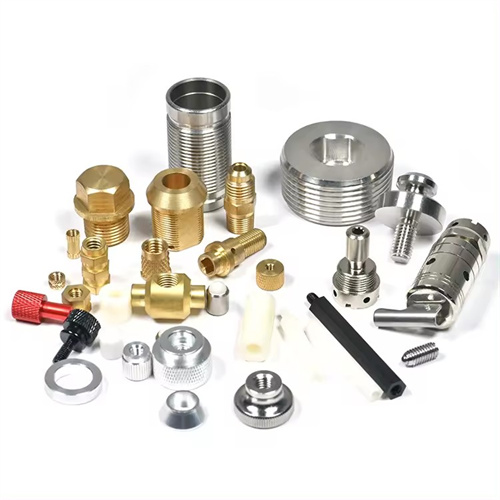
CNC Machining
CNC Machining (Computer Numerical Control Machining) is a manufacturing process that uses computerized controls and machine tools to remove material from a workpiece to create custom-designed parts or products. CNC machining is highly precise and versatile, making it suitable for producing complex geometries and high-tolerance components. The process is widely used across various industries due to its efficiency, repeatability, and ability to work with a wide range of materials, including metals, plastics, and composites.
CNC machining as Computerized Numerical Control Machining, is a technology that utilizes CNC machine tools to perform precise machining on workpieces. CNC machine tools are controlled by computers and automatically complete machining operations such as cutting, drilling, and milling by reading pre written programs (usually G code).
Our CNC Machining factory focuses on providing customers with high-quality and high-precision metal and plastic processing services. We have advanced CNC machine tools and a professional technical team, which can meet various complex processing needs of customers.
Our factory is customer-centric, providing fast response and delivery services. Once the customer submits a processing requirement, our technical team will quickly evaluate and provide a quotation, and provide a processing plan in the shortest possible time. Our production department will strictly follow the production plan and delivery deadline to ensure that customers can receive the products on time.

Key Features of CNC Machining:
High Precision: CNC machines can achieve extremely tight tolerances, often within micrometers, ensuring high accuracy in the final product.
Versatility: CNC machining can produce a wide variety of parts, from simple shapes to highly complex geometries.
Repeatability: Once a design is programmed, CNC machines can produce identical parts repeatedly with minimal variation.
Material Flexibility: CNC machining can work with metals (e.g., aluminum, steel, titanium), plastics, and composites.
Automation: CNC machines operate with minimal human intervention, reducing labor costs and increasing efficiency.
Common CNC Machining Processes:
CNC Turning: A process where the workpiece rotates while a cutting tool removes material to create cylindrical parts like shafts, rods, and bushings.
CNC Milling: A process where a rotating cutting tool removes material from a stationary workpiece to create complex shapes, slots, holes, and contours.
CNC Drilling: Used to create precise holes in a workpiece.
CNC Grinding: A finishing process that uses an abrasive wheel to achieve high surface quality and tight tolerances.

Applications of CNC Machining:
CNC machining is used to produce a wide range of components, including gears, shafts, fasteners, ball joints, and custom parts for various industries. Below is an introduction to the applications of CNC machining in four randomly selected industries.
LED Lighting
In the LED lighting industry, CNC machining is used to manufacture precision components for lighting fixtures, such as heat sinks, housings, and reflectors. These components require high accuracy to ensure optimal performance and heat dissipation.
Application Examples:
Heat Sinks: CNC machining is used to create intricate heat sink designs that efficiently dissipate heat from LED modules.
Housings: Precision-machined housings protect LED components and ensure proper alignment.
Reflectors: CNC-machined reflectors are designed to direct light accurately, enhancing the efficiency of LED lighting systems.
Electronics
In the electronics industry, CNC machining is used to produce components for devices such as smartphones, computers, and circuit boards. The process is ideal for creating small, intricate parts with high precision.
Application Examples:
Enclosures: CNC-machined enclosures for electronic devices provide durability and precise fitting for internal components.
Connectors: Precision-machined connectors ensure reliable electrical connections in electronic circuits.
Heat Spreaders: CNC machining is used to create heat spreaders that manage thermal performance in electronic devices.
Medical Devices
In the medical device industry, CNC machining is critical for producing high-precision components such as surgical instruments, implants, and diagnostic equipment. The process ensures compliance with strict regulatory standards and delivers parts with exceptional accuracy and surface finish.
Application Examples:
Surgical Instruments: CNC machining is used to create scalpels, forceps, and other tools with precise dimensions and smooth surfaces.
Implants: Custom-machined implants, such as orthopedic screws and dental prosthetics, are tailored to individual patient needs.
Diagnostic Equipment: CNC-machined components for MRI machines, X-ray systems, and ultrasound devices ensure reliable performance.
Sports Goods
In the sports goods industry, CNC machining is used to manufacture high-performance components for equipment such as bicycles, golf clubs, and fitness machines. The process enables the production of lightweight, durable, and precise parts.
Application Examples:
Bicycle Components: CNC machining is used to create lightweight and strong parts like cranks, derailleurs, and brake components.
Golf Clubs: Precision-machined club heads and shafts enhance performance and accuracy.
Fitness Equipment: CNC-machined parts for treadmills, weight machines, and other fitness equipment ensure durability and smooth operation.

CNC machining is a cornerstone of modern manufacturing, offering unparalleled precision, versatility, and efficiency. Its applications span across industries such as LED lighting, electronics, medical devices, and sports goods, where high-quality, custom-designed components are essential. By leveraging CNC machining, manufacturers can produce complex parts with tight tolerances, ensuring optimal performance and reliability in their products.